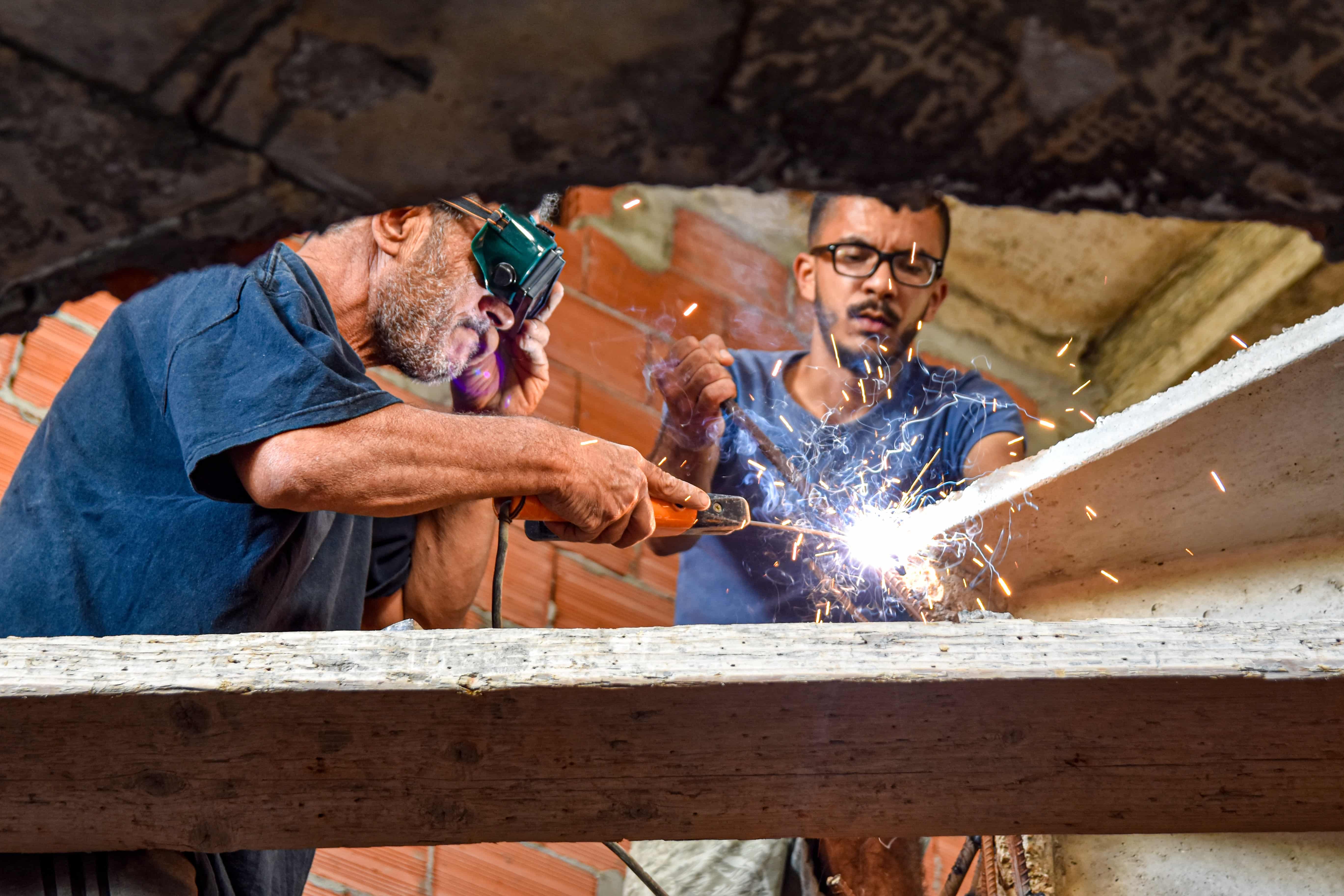Becoming a tradesperson can be easy, however, finding a job that'll pay an above-average salary can be challenging. Nonetheless, since the pandemic of Covid-19 hit in 2020, the skilled trade industry has seen an important increase in demand due to the different challenges that confinement presented.
This is why, if you are interested in becoming a tradesperson, you must learn everything you can about this career path. Continue reading to understand what are skilled trades, what industries you could work in, how much tradespeople earn per year, and what variables can increase your salary.
Keep in mind that you can also start searching for a private tutor right here on Superprof!

What is a Skilled Trade?
The College and Career Access Center claim that skilled trades are jobs that require special skills and knowledge and usually require manual or physical activity.
For example, nursing is a type of skilled trade because, even though nurses need to know about medicines, diagnosis, anatomy, and disease; they also need to learn how to move patients, assist doctors, react during emergencies, and so on.
People who pursue a career in skilled trades go into their field of interest depending on their talents, abilities, prior knowledge, or simply because they feel passionate about the industry.
Most skilled trade jobs will require specific gear or equipment but it'll vary depending on the industry you work in. For instance, an electrician will need cables and tools, but someone in construction will need hammers, protective gear, and so on.

There are plenty of fields and industries that you could be working in, but some industries have a bigger demand for workers or better salaries. Students tend to go for better-paying jobs but we also recommend looking into the jobs that are in demand.
Skilled trade jobs are typically divided into three categories which are:
- Industrial Trades: welders, machinists, mechanics, tool and die makers, programmers
- Construction Trades: electricians, plumbers, gasfitters, carpenters, bricklayers, technicians, insulators
- Service Trades: nurses, aides, orderlies, therapists, service technicians
To learn about either of these trades you can go to the Superprof home page and start searching for tutors in your area. Once you specify what it is you want to study and where; all the tutors who have signed up for Superprof will pop up on your screen.
You then get to pick and choose who you'd like to work with. Some tutors tend to offer the first lesson for free to give you an opportunity to ask questions, see what a class is like with them, and have enough information to make an informed decision.
What are the different fields of work?
There are three categories that divide skilled trades, industrial, construction, and service trades. Each field has different demands, types of workers, salaries, and more.
For instance, some skills require a college education and a bachelor's degree, while others are learned through different programs or certifications. Some trades even have their own specialized schools where they offer associate degrees or annual training.
If you work in the industrial field, you can become a mechanic or a welding engineer. To work in this field, you need to have accurate equipment, have an interest in industrial fabrics, understand that you'll be working mostly surrounded by greasy things and that you can be anything from a technician to an engineer.
However, if you go into the construction field, you'll spend most of your time on a construction site doing different jobs. For instance, you can be there early on during the construction helping out the architect, directing the construction technicians, or putting other skills to work.

You could also be working at a construction site close to the end of the building process as an electrician making sure the building is set up with the best electrical system.
Finally, you can go into the noblest occupation and work in the service field. You can become anything from a service technician to a nurse. Service jobs are jobs where professionals dedicate their careers to the service of others, regardless of the field.
You can also learn what are the qualifications needed for different trade skills and understand which jobs require a bachelor's degree, and what jobs can be done with different education (aside from high school, college, bachelor's degree, and so on).
Other forms of obtaining an education can be online courses, private programs, apprenticeships, or certifications. You can go online and find a program that offers a certification for any aspiring technician, electrical practitioner, or mechanic.
Another alternative is finding a certified tutor and doing all your school or training with them. Superprof counts with tutors from all kinds of backgrounds who are highly prepared. All students have to do is search for someone with the highest possibility to teach them everything they know.
How much does a tradesperson make?
Many students tend to choose their career path depending on the median salary of the job. It is only normal to want to go into a career that offers a competent annual salary!
Below you'll find a list of the highest-paying trades in the United States, their median annual salary, and the minimum education needed according to the NGO Accredited Schools Online:
| Job | Median Annual Salary | Education |
| Construction Manager | $97,180 | Associate Degree |
| Elevator and Escalator Installers and Repairers | $88,540 | High school diploma |
| Radiation Therapists | $86,850 | Associate Degree |
| Nuclear Medicine Technologists | $79,590 | Associate Degree |
| Dental Hygienists | $77,090 | Associate Degree |
| Electrical Engineering Technicians | $67,550 | Associate Degree |
| Aircraft and Avionics Equipment Mechanics and Technicians | $66,680 | Trade school |
| Boilermakers | $65,360 | High school diploma |
| Construction and Building Inspectors | $62,860 | High school diploma |
| Electricians | $56,900 | High school diploma |
If you can't make up your mind about what trade to learn, you can first know which skills are most in demand in the United States. Below, there's a list of the cities in the United States that pay the highest for trade skills annually:
- Atkinson, NE - $55,035
- San Francisco, CA - $52,576
- Bolinas, CA - $52,228
- Marysville, WA - $51,129
- Ramblewood, PA - $50,499
- Stone Ridge, NY - $49,989
- San Jose, CA - $49,699
- Frankston, TX - $49,654
- Jackson, WY - $49,121
- Harbor Isle, NY - $49,020

If you are having a hard time deciding, you can ask for external help from advisors who have training and knowledge in what careers could be best for any individual.
We do recommend you don't only base your decision on how much you're going to earn. The salary of each job is important but it shouldn't be a defining factor when choosing a career path.
If you pick careers depending only on the salaries after some time (longer than a year) you might end up feeling unfulfilled or unsatisfied with your work.
We all need a good-paying job, but we shouldn't sacrifice our mental well-being just to earn more money. The best job or trade is the one that you enjoy doing the most and that you do more than well.
What can increase or decrease my salary?

The highest-paying jobs are for the workers with the most outstanding careers. This is why, on average, schools tend to design programs for students who are interested in any skilled trade.
For instance, salaries, on average, are the same for the same job. However, if a worker has more preparation compared to others, they can use that as a negotiation point during their interviews.
Things that can decrease salaries are things like poor education, decreased stability, changing jobs every year, shifting careers all the time, changing schools, and so on. Having stability has a high reward!
On the other hand, the things that can increase how much you earn are having better education, attending the best program in the country in your field, working for big companies, having years of experience, being well-known in the industry, and so on.
Keep in mind that the annual salary of a tradesperson can also vary depending on the demand. For instance, there might be a boom in mechanics and suddenly every company in the field will start looking for a mechanic. This means that the salaries can become competitive and companies might start fighting for mechanics.
To jumpstart your career as a tradesperson you first need to figure out how you'll learn everything you need to know to be able to work in whichever field you are interested in.
Once you figure out what path to take you have to work hard and continuously search for work opportunities. This is the only way you'll gain experience and build a strong resume.
You can also search for private tutors right here on Superprof and ask them to help you gain knowledge and guide you through the intricacies of the job.
Résumer avec l'IA :










